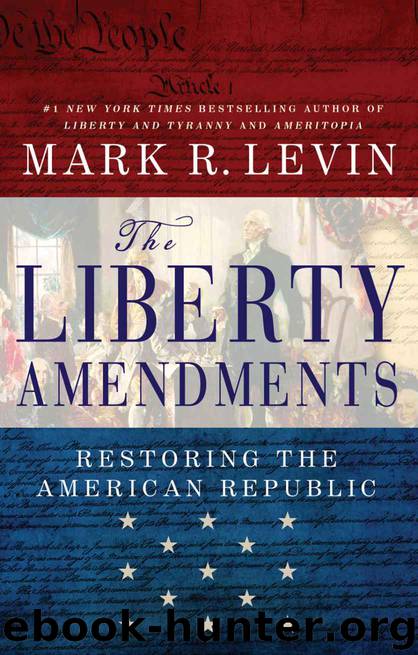The Liberty Amendments: Restoring the American Republic by Levin Mark R

Author:Levin, Mark R. [Levin, Mark R.]
Language: eng
Format: epub
Publisher: Threshold Editions
Published: 2013-08-13T00:00:00+00:00
CHAPTER EIGHT
* * *
AN AMENDMENT TO PROTECT PRIVATE PROPERTY
SECTION 1: When any governmental entity acts not to secure a private property right against actions that injure property owners, but to take property for a public use from a property owner by actual seizure or through regulation, which taking results in a market value reduction of the property, interference with the use of the property, or a financial loss to the property owner exceeding $10,000, the government shall compensate fully said property owner for such losses.
INFLUENCED BY LUMINARIES SUCH as John Locke and William Blackstone, the Founders understood that the fundamental right to own and maintain property was an essential element in a functioning civil society. In The Second Treatise of Government, which was hugely popular during the American founding and heavily relied on by Thomas Jefferson in drafting the Declaration of Independence, Locke asserted:
[The government] cannot take from any man any part of his property without his own consent. For the preservation of property being the end of government, and that for which men enter into society it necessarily supposes and requires, that the people should have property, without which they must be suppos’d to lose that by entering into society, which was the end for which they entered into it, too gross an absurdity for any man to own.1
In his celebrated Commentaries on the Laws of England, Blackstone also extols the right to property:
So great . . . is the regard of the law for private property, that it will not authorize the least violation of it; no, not even for the general good of the whole community. If a new road, for instance, were to be made through the grounds of a private person, it might perhaps be extensively beneficial to the public; but the law permits no man, or set of men, to do this without consent of the owner of the land.2
Blackstone added that “the public good is in nothing more essentially interested, than in the protection of every individual’s private right, as modeled by the municipal law.”3
Owning and preserving property free from oppressive government intrusion serves as one of the fundamental building blocks for a prosperous republic. James Madison noted, “Government is instituted no less for protection of property than of the persons, of individuals.”4 In short, property rights are unalienable rights. “The rights of property are committed into the same hands with the personal rights. Some attention ought, therefore, to be paid to property in the choice of those hands.”5 Gouverneur Morris, a widely influential Founder, observed that enshrining property rights in a civil society was a necessary antecedent to any concept of a functioning community. “Without society property in goods is extremely precarious. There is not even the idea of property in lands.”6 Like Madison, Morris believed that an elemental purpose of any legitimate government was the preservation of property. “Conventions to defend each other’s goods naturally apply to the defense of those places where the goods are deposited. The object of such conventions must be to preserve for each his own share.
Download
This site does not store any files on its server. We only index and link to content provided by other sites. Please contact the content providers to delete copyright contents if any and email us, we'll remove relevant links or contents immediately.
| Anthropology | Archaeology |
| Philosophy | Politics & Government |
| Social Sciences | Sociology |
| Women's Studies |
The Secret History by Donna Tartt(16681)
The Social Justice Warrior Handbook by Lisa De Pasquale(11495)
Thirteen Reasons Why by Jay Asher(7810)
This Is How You Lose Her by Junot Diaz(5805)
Weapons of Math Destruction by Cathy O'Neil(5058)
Zero to One by Peter Thiel(4841)
The Myth of the Strong Leader by Archie Brown(4797)
Promise Me, Dad by Joe Biden(4462)
Beartown by Fredrik Backman(4446)
How Democracies Die by Steven Levitsky & Daniel Ziblatt(4430)
Stone's Rules by Roger Stone(4427)
The Fire Next Time by James Baldwin(4357)
100 Deadly Skills by Clint Emerson(4095)
A Higher Loyalty: Truth, Lies, and Leadership by James Comey(4045)
Rise and Kill First by Ronen Bergman(4029)
The David Icke Guide to the Global Conspiracy (and how to end it) by David Icke(3900)
The Farm by Tom Rob Smith(3884)
Secrecy World by Jake Bernstein(3793)
The Doomsday Machine by Daniel Ellsberg(3743)
